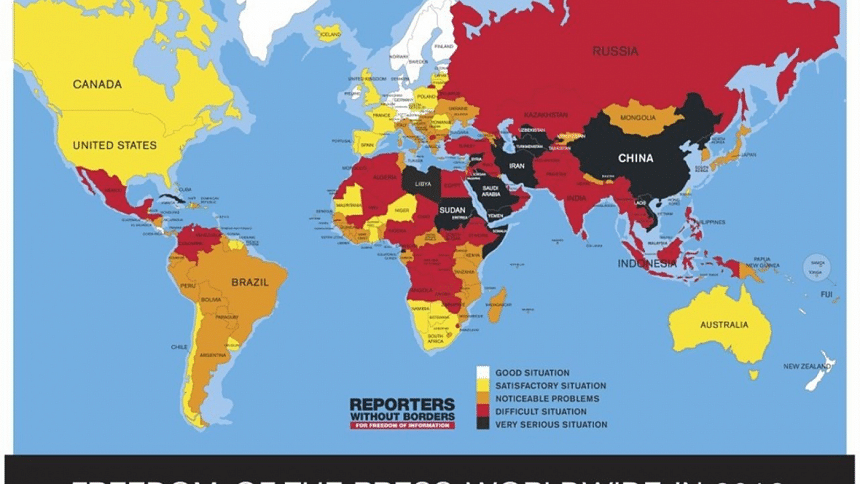Why you need a free media

Do you know that only 13 percent of the world population enjoys a free press? According to Freedom House Report of Press Freedom, in 2016 the safety of journalists was guaranteed in just 13 percent of the world's population. Forty-one percent has a partly free press and 46 percent live in not free media environment. Impunity for crimes against journalists is becoming the biggest threat to media freedom. The Committee to Protect Journalists (CPJ) recently claimed that Afghanistan, Pakistan, Bangladesh and India are among the 13 most dangerous countries for the journalists. Other dangerous countries for journalists are Somalia, Iraq, Syria, Philippines, South Sudan, Mexico, Brazil, Russia and Nigeria. CPJ's 2016 Global Impunity Index spotlights countries where journalists are slain and their killers go free.
November 2 is observed as the international day to end this impunity. This year UNESCO and many media organisations, including Free Press Unlimited, IFJ, CPJ, and RSF, are organising special events to raise their voice against impunity for crimes against journalists.
Growing extremism and intolerance of some democratic regimes has created a lot of threats for media freedom in South Asia, Middle East, Africa and Latin America. In some countries, security agencies are trying to silence the voice of journalists in the name of national interest. A recent case in point is Turkey where a democratic regime is silencing the voice of media in the name of "protecting democracy". Unfortunately, media is losing its freedom very quickly in many Muslim countries; however, Europe is no longer an exception either. The massive influx of migrants to Europe indirectly resulted in a variety of limitations on media freedom. One example is Hungary, where police attacked several journalists who were reporting violent clashes between riot officers and migrants arriving at the country's southern border. A series of attacks on journalists were reported in Germany by far-right groups who were opposing Chancellor Angela Merkel's welcoming policies towards refugees.
I live in South Asia and that's why I am more concerned about growing threats to media freedom in my part of the world. There is democracy in Pakistan, Bangladesh and India, but why have these three South Asian countries become so dangerous for media? Extremism is not the only reason. Reporting against criminals and corrupt mafias is also becoming difficult. Sometimes people sitting in power corridors don't like voices of dissent and they try to silence journalists by declaring them to be "anti-national". I believe that freedom of expression plays a very crucial role in good governance, transparency and accountability. South Asian economies cannot achieve the goals of sustainable development without good governance and it is not possible if the media is not allowed to raise some fair questions. Many journalists and bloggers were killed in Pakistan, Bangladesh and India but their killers have not been arrested. More than 100 journalists and media workers lost their lives in Pakistan since 2005. Almost one journalist is killed every month, but only two cases have been resolved as of yet. One Pakistani journalist, Hafiz Husnain Raza from Okara, Punjab, was arrested in April 2016 under terrorism charges because he wrote about peasants fighting for their lands occupied by security agencies. Pakistani media is losing its freedom very quickly. It's unfortunate that the Pakistani government sacked its Information Minister Senator Pervez Rashid just because he failed to censor the story published in Dawn about alleged differences between civilian and military leaders. The writer of the story Cyril Almeida left the country because many politicians demanded to initiate a treason case against him.
India is the largest democracy in the world with a strong judiciary and vibrant media. Ninety-five journalists have been murdered in India since 1990, and very few cases have been resolved. For example, journalist Jagendra Singh was allegedly set on fire by Uttar Pradesh police in 2015 because he posted a Facebook status accusing a local minister of corruption. No one has been prosecuted in this case. A few weeks ago, the daily Kashmir Reader based in Srinagar was shut down by Indian authorities in the state of Jammu and Kashmir because the paper refused to take dictation from security forces. Many liberal and secular Bangladeshi journalists face criminal and treason cases just because they pose some valid questions and powerful people within the government fail to answer the questions.
According to the International Federation of Journalists (IFJ) 2016 report on impunity, only one out of ten deaths of journalists is investigated. IFJ's #endimpunity 2016 campaign aims at holding all governments accountable for the impunity of crimes against journalists, but it has specifically emphasised on four countries - Mexico, Pakistan, India and Yemen. Pakistan and India are going through some very tense relations these days but they appear united in one approach. Security establishments and the political elite in both countries don't seem to like free media. They always try to use "tamed" media against each other. If they change their approach and give adequate freedom to the media then journalists on both sides could play a positive role in minimising the tension between the two countries. Only a fear free media can bring durable peace in this world. The first step for creating a fear free media is to end impunity. Let's together raise our voice against impunity for crimes against journalists.

 For all latest news, follow The Daily Star's Google News channel.
For all latest news, follow The Daily Star's Google News channel. 




Comments